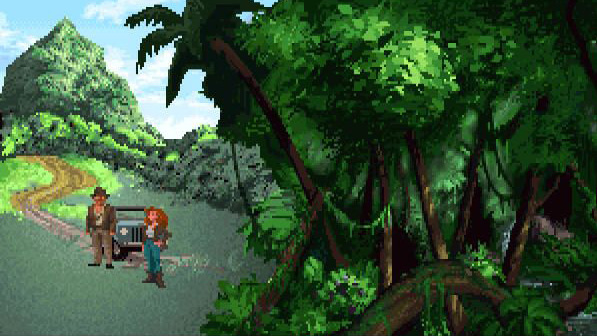
For more than 30 years, one paragraph from a gaming manual has stuck with me like no other.
“We believe that you buy games to be entertained, not to be whacked over the head every time you make a mistake. So we don’t bring the game to a screeching halt when you poke your nose into a place you haven’t visited before.”
This is a direct quote from the original manual that came with the classic point-and-click adventure game Indiana Jones and the Fate of Atlantis, released by LucasArts in June 1992 for the DOS, Amiga and Macintosh systems.
The game designers may have strayed a bit from this philosophy, though, because seven-year-old James struggled mightily at times to get through this one. For decades it was one of the only games from my youth that I actually couldn’t finish — but I had a blast trying, and it’s fondly remembered by many as one of the best Indy stories that never made it to the big screen.
So as the world prepares for the upcoming theatrical release of the fifth and final Indiana Jones movie, Dial of Destiny, let’s do a little time travelling of our own and revisit Atlantis.
There have been dozens of Indiana Jones video game titles over the decades. Some are just game versions of the films, while others, like Atlantis or its successor, Infernal Machine, are wholly original stories. A new original game is currently being produced by Bethesda and MachineGames, though very little is known about it.
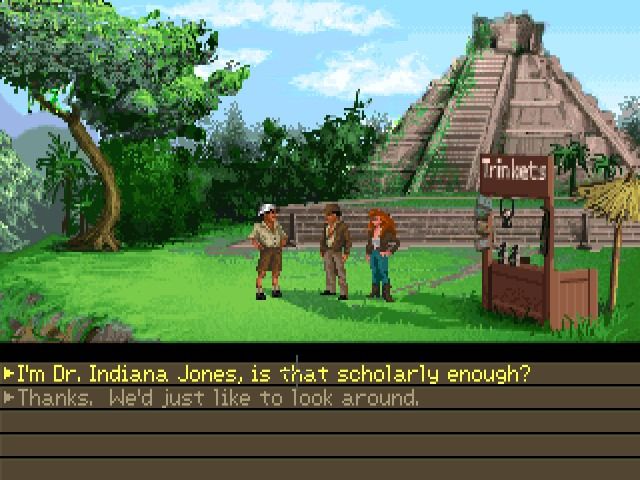 Atlantis, meanwhile, has been hailed as one of the best games the studio ever produced.
Atlantis, meanwhile, has been hailed as one of the best games the studio ever produced.
It was awarded numerous scores of 90 per cent or higher when it was released, and in his September 1992 review of the game for Computer Gaming World, Charles Ardai called Fate of Atlantis an “exuberant, funny, well-crafted and clever game” that’s worthy of the Indiana Jones name, with a “strong enough storyline to hold its own next to any of the Indy films.”
It’s hard to argue decades later. Everything you love about the movies is here — globetrotting adventure (complete with the classic movie scene transition of the world map and a red line crawling towards his destination); Indy’s whip is actually useful for everything from disarming Nazis to crossing over ravines and other dangerous situations; and the script is funny and smart.
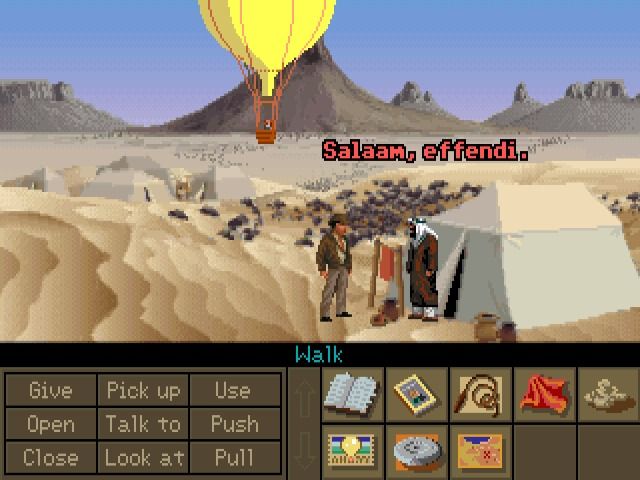 The story of Atlantis goes back more than 2,000 years to the writings of Plato around 360 BCE. But in the game, it’s 1939, the eve of the Second World War, and Nazi agents are about to get their hands on a weapon “more dangerous than the atom bomb” (according to the back of the game box).
The story of Atlantis goes back more than 2,000 years to the writings of Plato around 360 BCE. But in the game, it’s 1939, the eve of the Second World War, and Nazi agents are about to get their hands on a weapon “more dangerous than the atom bomb” (according to the back of the game box).
They’re searching for the fabled lost city of Atlantis, and chronologically the game comes soon after Indy rode off into the sunset in the film The Last Crusade.
Jones must, of course, stop the Nazis on their quest for power, and he travels from his fictional school of Barnett College in New York to Monte Carlo, Iceland, the Azores, Algiers, Crete and eventually (spoiler alert) the lost city itself.
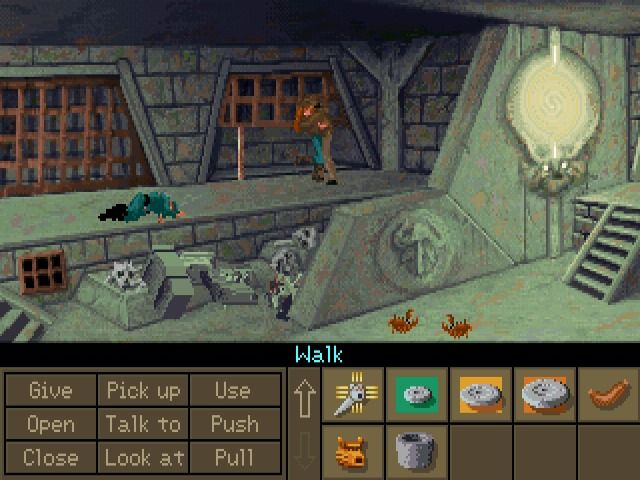 He is accompanied by a former archaeology student and love interest Sophia Hapgood. She has become an expert on Atlantis and is a self-professed psychic. Sophia claims she can communicate with Nur-Ab-Sal, the last Atlantean king, via an amber necklace from the lost city.
He is accompanied by a former archaeology student and love interest Sophia Hapgood. She has become an expert on Atlantis and is a self-professed psychic. Sophia claims she can communicate with Nur-Ab-Sal, the last Atlantean king, via an amber necklace from the lost city.
This game is pure nostalgia for me. It’s a point-and-click adventure that utilizes the publisher’s infamous SCUMM (Script Creation Utility for Maniac Mansion) game engine, originally developed for Maniac Mansion in 1987.
Players navigate the world by clicking on items of interest and using one of nine verbs (pick up, talk, push, pull, etc.) to interact with a range of items and people on screen. You can collect items in an inventory display that have been found along the way; some will be used more than once (like the trusty bullwhip), while others can only be used once before they break or are lost.
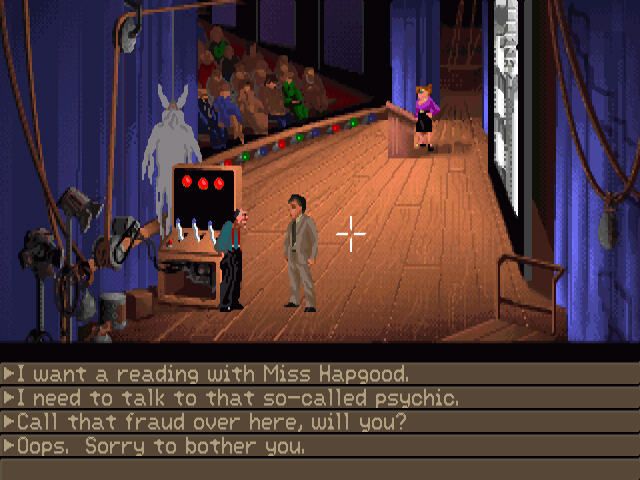 The pixelated graphics are a reminder of a bygone era of games where the images on screen weren’t lifelike representations of the real world, but an almost cartoonish visual style rendered in 256 colours. This pixel style has since become popular for many modern games as programmers and developers seek to stoke those nostalgic fires.
The pixelated graphics are a reminder of a bygone era of games where the images on screen weren’t lifelike representations of the real world, but an almost cartoonish visual style rendered in 256 colours. This pixel style has since become popular for many modern games as programmers and developers seek to stoke those nostalgic fires.
But while the search for Atlantis is the primary Macguffin of the story, it’s what’s inside the city that the Nazis actually want.
In the timeline presented in the game, around 1,600 BCE Atlantis was a technologically advanced civilization thanks to a visit from so-called “great horned beings” who bestowed unfathomable technology upon them, including a mysterious metal called orichalcum (a real metal, by the way) that was produced from lava and turned into pearl-sized beads to power their society.
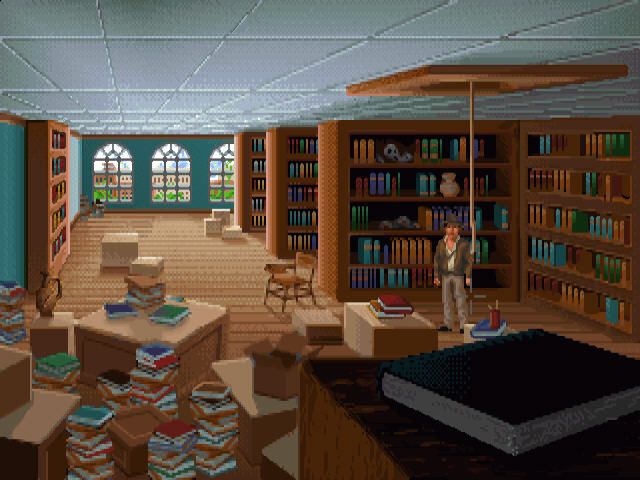 Some of the beads were scattered around the ancient world after Atlantis disappeared, and by the late 1930s the Nazis have begun to search for them. They believe orichalcum possesses the strength of an atom bomb but in a handy travel size that could power tanks or planes, and make more destructive bombs. Nazi scientist Dr. Hans Ubermann also believes he can harness this power to transform himself into a god.
Some of the beads were scattered around the ancient world after Atlantis disappeared, and by the late 1930s the Nazis have begun to search for them. They believe orichalcum possesses the strength of an atom bomb but in a handy travel size that could power tanks or planes, and make more destructive bombs. Nazi scientist Dr. Hans Ubermann also believes he can harness this power to transform himself into a god.
While the game is fondly remembered by most, it was also known for being very tough.
The puzzles ranged from silly and fun, to downright frustrating. At one point, you have to open the back of a bookshelf by using a makeshift screwdriver, which involves finding an arrowhead and an old rag, combining them in your inventory, then using it to remove the screws.
Later in the game after sneaking aboard a German U-boat headed for Atlantis, you distract a hungry sailor by finding some food items in the galley and assembling … wait for it … a submarine sandwich.
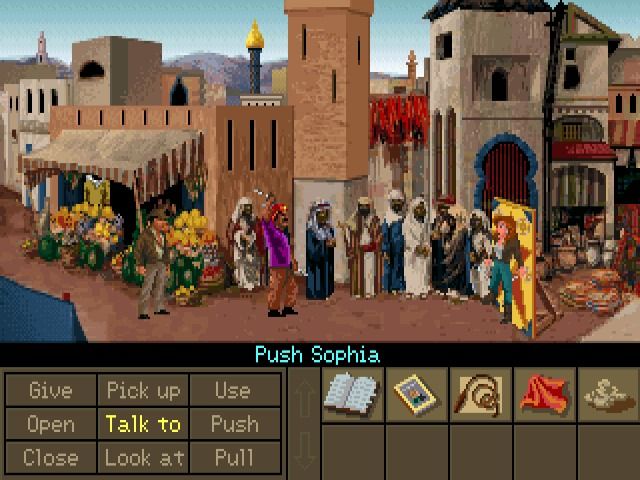
Of course, this frustration contributed to the eventual dopamine hit you received whenever you combined a few items in your inventory in a new way and discovered what the designers wanted you to do with that new tool.
Then there are the mazes. Oh the mazes.
Like I said, I never actually finished the game when I was a kid because I got stuck in Atlantis and wasn’t able to decipher the machinery or find my way through the labyrinth of tunnels and rooms. Gamers could (and frequently did) spend hours or even days on one section of the game, and often the solution just came down to dumb luck.
When I downloaded Atlantis on Good Old Games about a decade ago I did a speedrun of the game just to finally be able to see the story conclude. It was definitely worth the two-decade wait.
And while the same can’t be said about the film Kingdom of the Crystal Skull when it was released almost twenty years after Last Crusade, I plan to be one of the first in line to see Dial of Destiny with the hope it can close out the series with a story “worthy of the Indiana Jones name.”
Image credit: Moby Games (Screenshots)
MobileSyrup may earn a commission from purchases made via our links, which helps fund the journalism we provide free on our website. These links do not influence our editorial content. Support us here.


